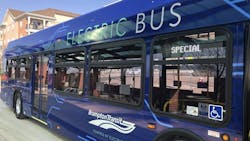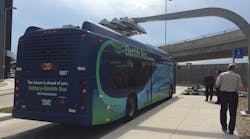CUTRIC prepping launch of Pan-Canadian Battery Electric Bus Demonstration and Integration Trial: Phase II in 2024
The Canadian Urban Transit Research and Innovation Consortium (CUTRIC) is prepping to launch Pan-Canadian Battery Electric Bus Demonstration and Integration Trial: Phase II later this year following the completion of Phase I in 2023.
CUTRIC began working on Pan-Canadian Battery Electric Bus Demonstration and Integration Trial: Phase I in 2016. The project used two transit vehicle manufacturers (New Flyer Industries of Winnipeg, Manitoba, and Nova Bus of St. Eustache, Quebec) and two charging station manufacturers (ABB Group and Siemens Canada) to successfully deploy 24 battery-electric buses (BEBs) and seven chargers across three transit agencies (Brampton Transit, TransLink and York Region Transit). The deployment of the buses and chargers began in 2019.
The buses and overhead electric charging stations plug into an open protocol known as the OppCharge protocol — which was first jointly developed by Volvo Bus Corporation. The protocol standardizes the design of the off-board pantograph that connects the high-powered charging station to the bus, communications between the bus and the charger and performance metrics of the overall system. The chargers were built to the same specifications and could be plugged into any of the transit agencies BEBs.
During the course of the Phase I trial, the three transit agencies saw a total savings of 2,341 tons of carbon, which is equivalent to 263,400 gallons of consumed gas.
Pan-Canadian Battery Electric Bus Demonstration and Integration Trial: Phase II is a multi-year project that marks a significant advancement following the successful initial phase, demonstrating interoperability among different bus and charger manufacturers. This phase is characterized by a focused empirical analysis, delving into battery degradation and testing J3105 supplements to ensure the long-term viability and reliability of electric bus batteries. Phase II aims to generate comprehensive reports addressing various elements of electric bus integration, including vehicle efficiency, battery recycling opportunities, thermal management strategies, range optimization, cybersecurity standards and operational support, alongside exploring innovative solutions, such as in-depot pantographs for enhanced operational flexibility.
Before beginning planning for Phase II, CUTRIC did the following:
- Collect feedback on Phase I
- Conducted meetings with all Phase I collaborators
- Initiated discussions with additional transit agencies and manufacturers
- Engaged with CSA Group — who’s mission is to enhance the lives of Canadians through the advancement of standards in the public and private sectors — to gather valuable insights on how to best proceed
Phase II is a closed door project, meaning participants will have access to results after the project closes before the rest of CUTRIC membership. It will feature two parts of analysis:
Empirical analysis
- Battery degradation
- Testing J3105 supplements
Reports
- Vehicle efficiency
- Battery recycling opportunities
- Thermal management
- Addressing range barriers
- Cybersecurity standards
- Support for expanded operations
- In-depot pantographs, low-powered situations
CUTRIC says its next steps before launching are:
- Conduct outreach to Canadian transit agencies with BEBs in service
- Host consultation sessions with CUTRIC members interested in joining to find any additional elements to add to the scope of work
- Collaborate with the Association internationale des études québécoises to expand reach in Quebec
- Schedule individual meetings with interested transit agencies
- Draft and execute the scope of work and memorandum of understanding for the project
More information on the Pan-Canadian Battery Electric Bus Demonstration and Integration Trial: Phase II can be found on CUTRIC’s website.

Brandon Lewis | Associate Editor
Brandon Lewis is a recent graduate of Kent State University with a bachelor’s degree in journalism. Lewis is a former freelance editorial assistant at Vehicle Service Pros in Endeavor Business Media’s Vehicle Repair Group. Lewis brings his knowledge of web managing, copyediting and SEO practices to Mass Transit Magazine as an associate editor. He is also a co-host of the Infrastructure Technology Podcast.






